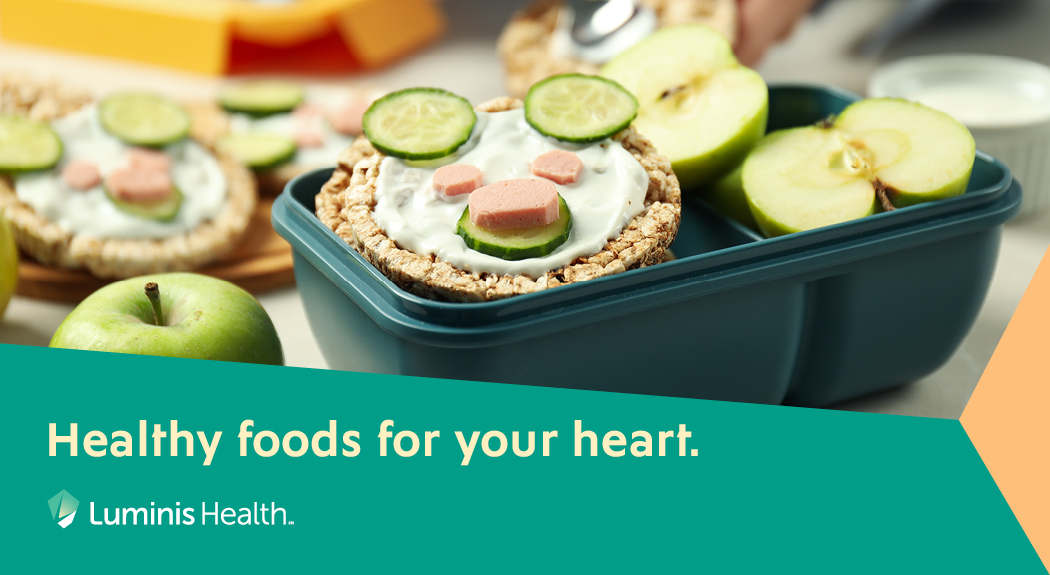
What are healthy foods for your heart?
The choices you make in your diet can have a powerful impact on your heart. Certain foods and beverages have nutrients and natural compounds that can lower cholesterol, maintain healthy blood vessels and protect your heart.
Here are the top picks for heart-smart foods to eat often. Adding these foods to your diet can keep your heart healthy and reduce your risk of a heart attack or stroke.
Leafy green vegetables
All vegetables are nutritious, but dark leafy greens like spinach, kale, Swiss chard, and collard greens are especially rich in vitamins, minerals and antioxidants that promote healthy blood clotting, lower blood pressure, and protect your heart and blood vessels. Eat leafy green vegetables daily by adding them to salads, sautéeing them as a side dish, adding them to soups or stews, or blending them into a smoothie.
Avocados
This creamy, satisfying fruit is full of heart-healthy, unsaturated fats. Replacing foods like butter, margarine, cheese, or processed meat with avocado can reduce your risk of heart disease. Skip the tortilla chips, though. For healthier ways to eat avocado, add it to your salad or sandwich or dip fresh vegetables into your guacamole.
Fresh or frozen berries
Colorful blueberries, strawberries, raspberries and blackberries contain polyphenols, antioxidants that reduce inflammation, protect blood vessels and lower your risk of cardiovascular disease. Fresh or frozen berries can be added to overnight oats, yogurt and salads, or enjoyed on their own for dessert.
Oats and barley
These whole grains are full of soluble fiber, which helps reduce LDL (bad) cholesterol. Soluble fiber also slows digestion and keeps you feeling full for longer, which can promote weight loss. Add these grains to your weekly meal plan by eating oats for breakfast and trying barley as a side dish, in soups, or as a base for salads.
Beans (legumes)
Chickpeas, lentils, black, pinto, kidney, white beans, and all other dried beans or legumes are heart-smart superfoods. They’re full of plant protein, cholesterol-lowering soluble fiber, and many other nutrients that support your heart, blood vessels, and blood pressure. A 2023 analysis of studies published in Nutrition, Metabolism, and Cardiovascular Diseases found that eating about 3 cups of beans each week can reduce your risk of heart disease. To meet that goal, add beans to soups, stews, chili, tacos, and salads, and blend them with herbs to make dips and sandwich spreads.
Fatty fish
Oily fish, such as salmon, sardines, mackerel, and rainbow trout, are excellent sources of omega-3 fats (fish oil). These essential fatty acids can help reduce blood pressure and triglyceride levels. Research links a higher fish intake to a lower risk of heart attack and stroke. As such, the American Heart Association recommends eating at least two servings (a total of eight ounces) of fatty fish each week. If you don’t like oily fish, lean fish or seafood like tilapia, cod, or shrimp still provides some omega-3 fats. Any type of fish is better than none.
Nuts and seeds
All nuts and seeds are excellent sources of unsaturated, heart-healthy fats which can improve your cholesterol. They also contain significant antioxidants to reduce inflammation and protect your heart and blood vessels from oxidative damage. To get the most benefits from nuts and seeds, vary them in your diet:
- Snack on almonds, peanuts, and pistachios.
- Sprinkle chopped walnuts, pecans, pumpkin, or sunflower seeds on salads and roasted vegetables.
- Add a spoonful of chia or ground flaxseeds to a smoothie.
Olive oil
Olive oil is an essential ingredient in the Mediterranean diet, and extensive research supports its benefits for heart health. A 2022 study published in Frontiers in Nutrition found about 1 ½ tablespoons of olive oil each day is enough to reap the benefits. Use it to make salad dressings, in place of butter or other oil for baking, and when roasting fish, chicken, or vegetables.
Tea
According to a 2021 study published in the Annals of Medicine, drinking two cups of unsweetened brewed green or black tea each day can reduce the risk and progression of cardiovascular disease. Researchers believe antioxidant compounds in tea called flavonoids account for its benefits. If you prefer herbal tea without caffeine, try hibiscus tea. A 2022 review and analysis of 17 studies published in Nutrition Reviews determined it can reduce risk by lowering blood pressure and LDL cholesterol.
The bottom line
When it comes to heart health, food is medicine, so try to incorporate as many of these foods as possible into your regular diet. If you are taking blood thinners or other medications, talk to your physician before making substantial changes to your diet as some foods can change the effectiveness of those medications. Make sure you stay on top of your heart and overall health by getting regular wellness checks and notifying your doctor about any heart-related symptoms.

Author: Luminis Health Chief of Cardiac Surgery, David J. Caparrelli, MD. Dr. Caparrelli has more than 20 years of experience in both cardiac and vascular surgery. To make an appointment with Dr. Caparrelli, please call 443-481-1358.



